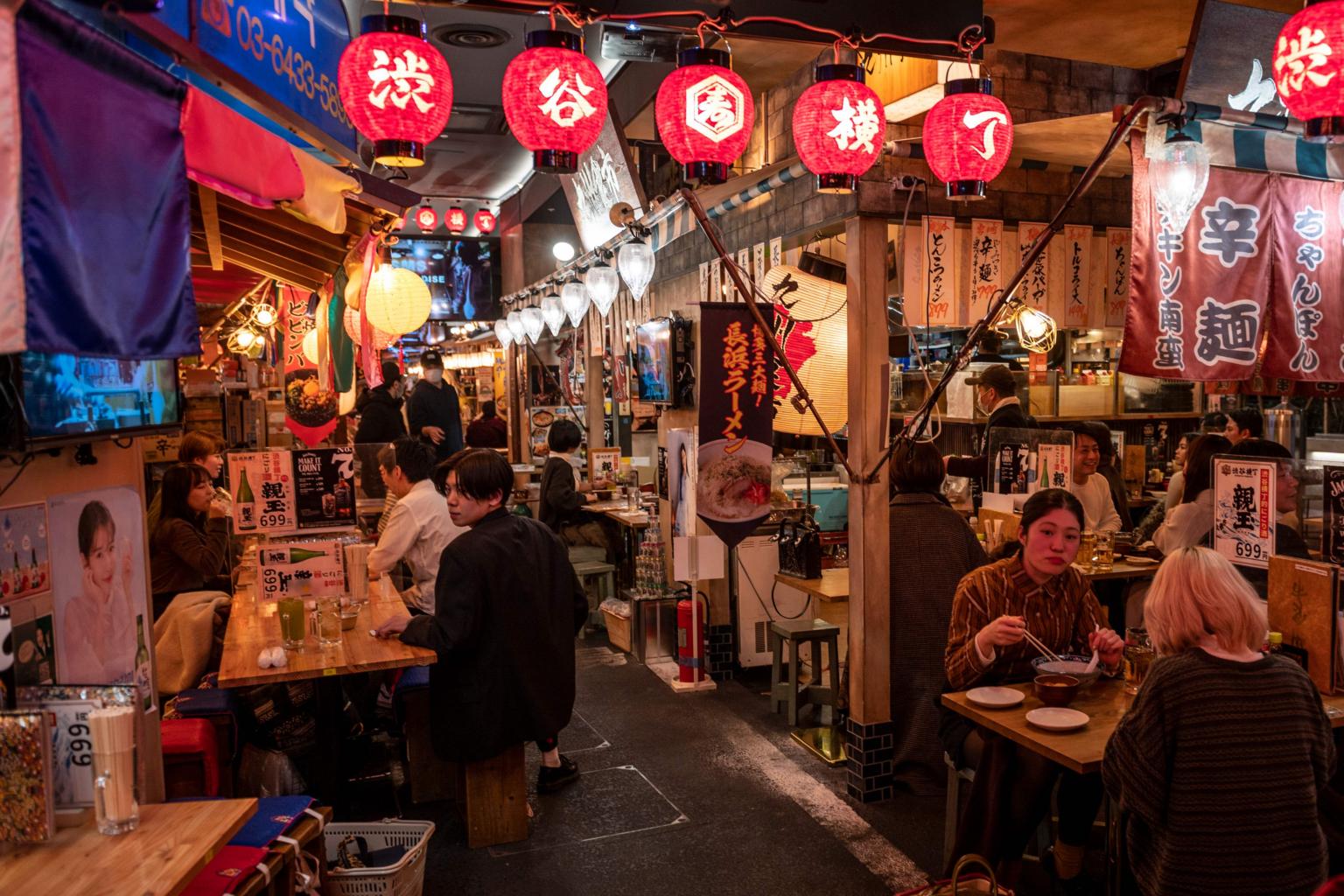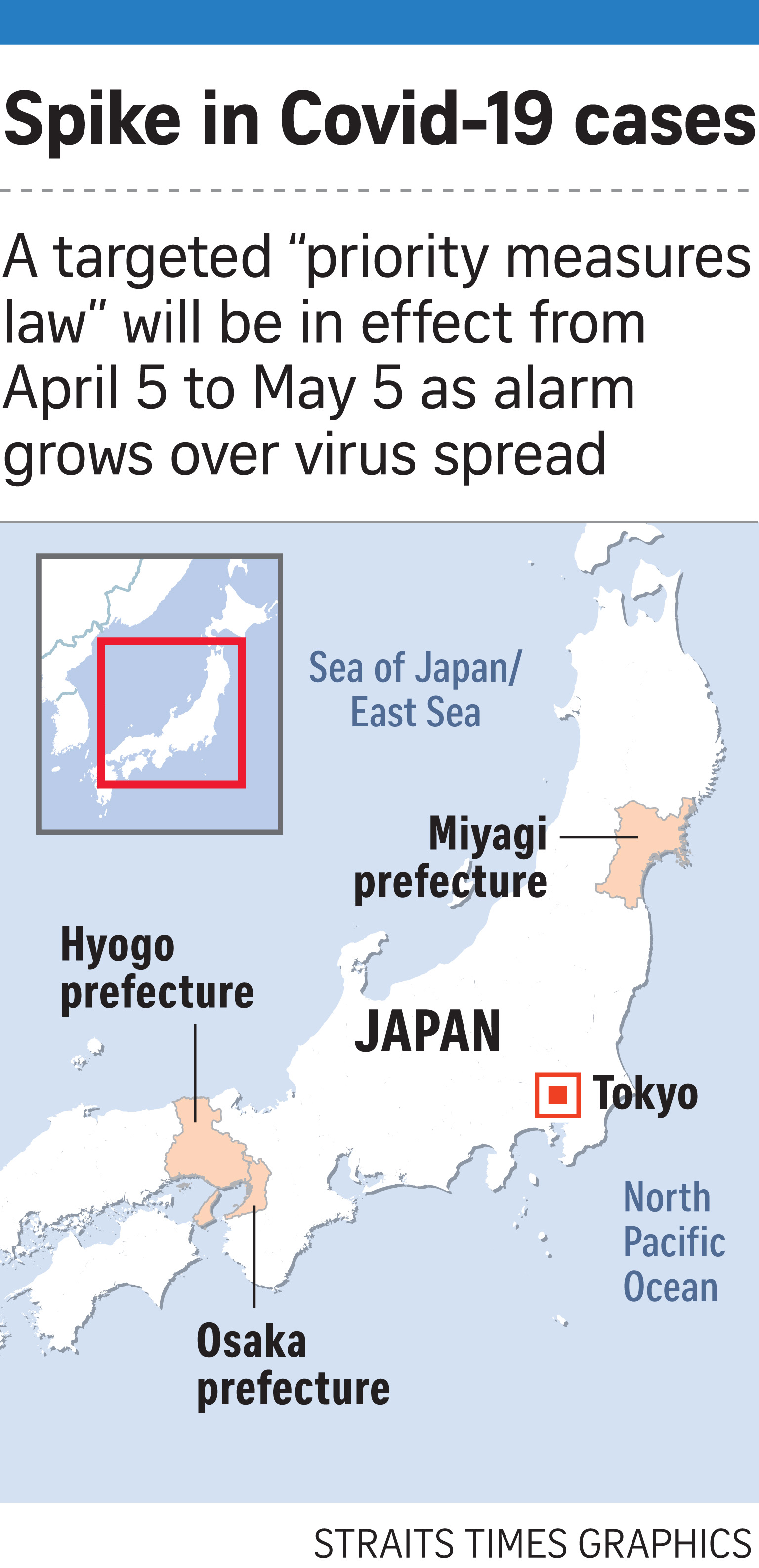Japan on brink of 4th Covid-19 wave less than 2 weeks after state of emergency lifted
Sign up now: Get insights on Asia's fast-moving developments

Restaurants and bars in six cities will be ordered to close by 8pm under a new anti-virus "priority measures law".
PHOTO: AFP
Follow topic:
TOKYO - Japan is on the brink of a fourth Covid-19 wave, with the country grappling with mounting cases involving mutant strains of the coronavirus and general indifference.
This comes less than two weeks after the lifting of a state of emergency that was limited in scope.
Prime Minister Yoshihide Suga on Thursday (April 1) used a new anti-virus "priority measures law" for the first time, covering parts of Osaka and Hyogo prefectures in western Japan and Miyagi prefecture in the north-east.
The law, which was passed by the Diet or Parliament in February, is an "emergency-lite" policy that can be targeted at specific areas rather than whole prefectures. It will cover six cities - Osaka City in Osaka; Kobe, Ashiya, Nishinomiya and Amagasaki in Hyogo; and Sendai in Miyagi - from April 5 to May 5.
Yet doubts have arisen over the effectiveness of measures that are essentially a rehash of what was done during the recent state of emergency.
Restaurants and bars in the six cities will be ordered to close by 8pm or face fines of up to 200,000 yen (S$2,430). Event attendance is to be capped at 5,000 people or half the capacity of a venue, whichever is lower, while telework is to be encouraged.
Mr Suga said that the targeted measures are aimed at mitigating economic damage while staving off the need for another state of emergency, as he repeated appeals for the public to wear masks, to avoid large parties or late-night dining, and to eschew unnecessary outings or non-essential travel across prefecture borders.
But the pleas are falling on deaf ears. Among the miscreants were health ministry bureaucrats, responsible for Covid-19 response measures, who were seen partying until midnight at a Ginza pub last week.
Warmer weather and cherry blossoms in full bloom have also led to large crowds nationwide. And with the start of a new fiscal year and school year on Thursday, many businesses and universities across the nation held in-person ceremonies to mark the occasion.
Japan Medical Association chairman Toshio Nakagawa warned that the country was "lurching towards a fourth wave that may well surpass the third". Japan set its largest single-day tally on Jan 8, with 7,949 cases. There were 2,592 cases on Thursday, just shy of the 2,843 the day before, which was the highest figure since Jan 30.
All this will be a headache for Mr Suga, whose Cabinet approval ratings highly depend on keeping Covid-19 infections low. Public support for the Olympics remains abysmal, while a general election is due by October.
The spike will also complicate any bid to restart the Go To Travel domestic tourism subsidy campaign that was blamed for catalysing the third wave of cases.
At least six prefectures - Miyagi, Aomori, Yamagata and Niigata in the north-east, and Tottori and Ehime in the west - have logged new record highs in the past week.

A further surge may yet threaten the ongoing Tokyo Olympics torch relay. With Osaka City under the priority measures law, Osaka Governor Hirofumi Yoshimura wants the relay to skip the city, where it is due to pass through on April 14.
"We need to avoid crowds in Osaka City," he said, adding that the event "falls into the category of (encouraging) non-essential outings".
But he had no objections to the relay passing through other parts of the prefecture.
Osaka logged 616 cases on Thursday, just shy of the record 654 set on Jan 8, and eclipsing Tokyo's tally for the third straight day.
Tokyo is also alarmed by the steady rise in cases since the emergency over the capital was lifted on March 21, with the 475 cases recorded on Thursday the highest since Feb 10.
Other areas that are seeing a resurgence include Okinawa with 111 cases on Wednesday, its highest tally since Jan 27. There were 93 cases on Thursday.
Also compounding the problem is Japan's slow vaccination rollout. Public inoculations will only start on April 12 in just two of the country's 1,718 municipalities.


